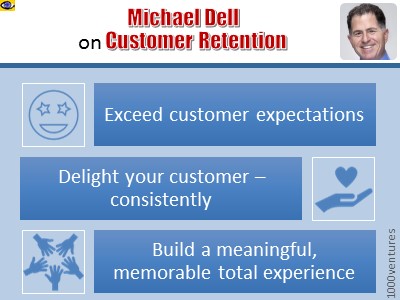| |
Michael Dell founded Dell Inc.
at the age of 19 in 1984 with $1,000 and
an
unprecedented idea – to build relationships
directly with customers.
At the age of 27,
he became the youngest CEO of a company ever to
earn a ranking on the Fortune 500. |
|
 |
| |
|
Michael
Dell's Entrepreneurial Spirit
|
|
|
|
|
|
Michael is 8: Michael makes a serious attempt to earn his high school diploma
more quickly by passing a test and invites a person from a testing
company.
Michael is 12: Michael embarks upon his very first business
venture. Fascinated with stamps and commercial opportunities they
offer, Michael creates his own stamps auction. He wants to bypass
traditional auctioneers, learn more about stamps, and collect a
commission in the process. Michael gets a bunch of people in the
neighborhood to consign their stamps to him; advertises "Dell's
Stamps" in Linn's Stamp Journal; types, with one finger, a
twelve-page catalogue and mails it out. He earns $2,000 and learns
an early, powerful lesson about rewards of eliminating the
middleman. He also learns that if you've got a good idea, it pays to
do something about it.
Michael is 16: Michael gets a summer job selling newspaper
subscriptions to The Houston Post and learns the power of
market segmentation. The newspaper gave Michael a list of new phone
numbers issued by the telephone company and tells him to cold call them.
Michael soon notices the pattern, however, based on the feedback he is
getting from potential customers during these conversations. There are
two kinds of people who almost always buy subscriptions to the Post:
people who have just married and people who have just moved into new
houses or apartments.
|
|
 |
Why don’t I just sell out, buy a boat,
and sail off to the Caribbean? Sailing’s boring. Do you have any
idea how much
fun it is to run a billion-dollar company? |
Michael
Dell
Dell Inc. |
 |
|
VK-pedia is a super-feed for your
genius and a Growth Mecca. It contains
information on boosters of
super-thinking,
highersight,
genius inventiveness,
super-creativity,
super-intelligence, breakthroughs,
entrepreneurial smartness,
venturepreneurship,
innovation A-Z/360, mega-achievements, and
harmonious growth. |
|
|
|